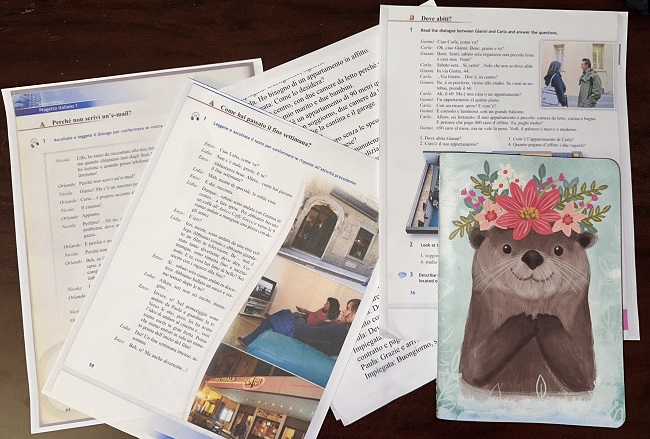By Victoria Averbukh
Ever since my parents took me to Italy for the first time – it was a gift for graduating school – I knew it was love at first sight. I wanted to explore further; which is how I ended up in my first Italian language course.
My first attempt to learn Italian was doomed to failure. When you know how to use Passato Prossimo correctly, but you have no one to talk to, then all knowledge is lost.
Time passed, but my love for Italy only grew stronger. I read books by Italian writers, watched films by Italian directors (naturally, in translation), visited museums to see exhibitions of Italian artists. Finally, I figured it was time to try learning Italian again.
Interestingly, most of my friends were genuinely surprised: why do you need Italian if you live in America? English and Spanish are enough.
What if they are right? Really, maybe I am wrong and I should find another hobby? Why do people learn Italian if they don’t live in Italy? I asked this question to groups of Italian expats, to groups where students of Italian courses communicate, and to the teachers themselves.
Surprisingly, the motivation for most students is about the same as mine: we admire the rich culture and history of this country and want to know more about it. After all, language is not only a way of communication, but also the key to understanding the mentality, traditions, folk culture and humor.
A friend of mine, Italian-American, taught me one joke: “Dottore, ha qualcosa contro la tosse?” – “No no, tossisca pure!”. It’s translated as: “Doctor, do you have something against coughing?” – “No, no, go ahead and cough!” Both in Italian and English “to have something against something” means “to have a problem/cure with something”. The patient asks the doctor to prescribe him cough medicine, but the doctor replies to the other meaning, that of having a problem with coughing. By the way, she was born and raised in New York and learnt Italian all by herself. And it’s more common in the USA, considering how large Italian American community is here. Having Italian grandparents or more distant relatives usually come together with the idea to better understand your heritage.
One of the students decided to study Italian after falling in love with Italian cuisine. He took several cooking courses, but decided to learn how to cook the way real Italians cook. The biggest problem for him now is to learn not only classical Italian, but also learn to understand what the cooks from Sicily, an already advanced level.
My teacher, who graduated from the university in Rome, says that most students from Europe want to learn Italian for business reasons; students from former Soviet Union have less rational motivation: a lot of women are still in love with Adriano Celentano.
My former classmate was kind of fashionista, so she decided to learn Italian to know more about fashion, designers and so on. Now she is living in Italy and works in fashion industry – and it’s all started from her small hobby!
Learning Italian – or, at least, having basic Italian knowledge – is necessary for those who study world culture and history. I remember how our tour guide told us that almost 80% of world culture, landmarks, and artifacts are in Italy. 60% of the world’s most important works of art are in Italy. The country also boasts the most UNESCO World Heritage sites (a total of 58). Italy is s cradle of European civilization as we know it.
As for me, I just passed my A-1 level test. I came to an Italian deli, which my friends — a family couple from Puglia, Italy — recently opened in our neighborhood, and proudly told them:
— Ho studiato italiano per due mesi e mezzo e ho superato l’esame, ma ancora non parlo bene l’italiano.
But I know for sure that’s just the beginning of my journey.







